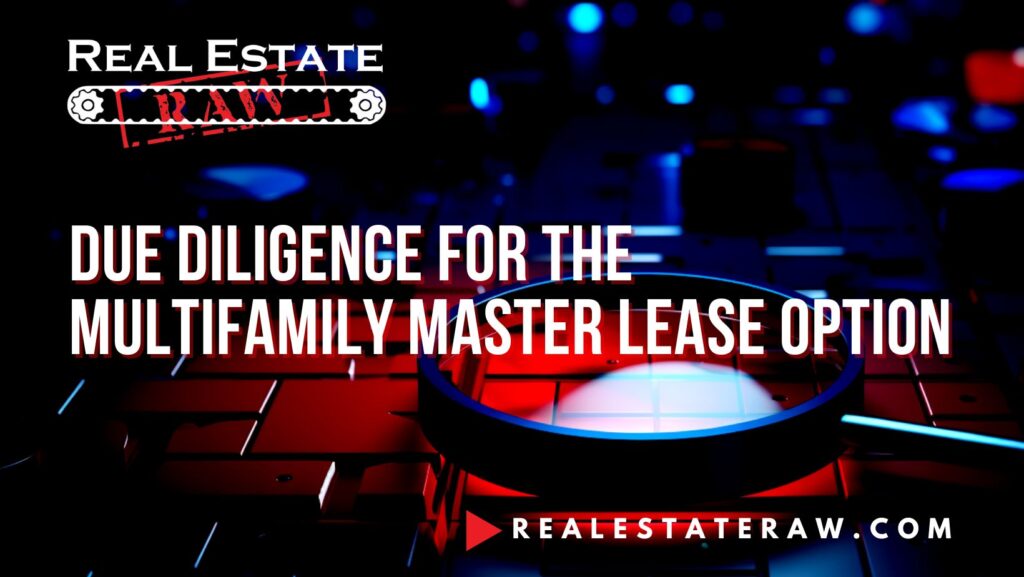Conducting accurate due diligence on a property and seller is just as important as analyzing the financial data. You will want to do your due diligence as if you were buying the property and paying all cash. If you were about to spend that much of your hard-earned money, then I imagine you would want to know what you were buying.
The due diligence for a multifamily master lease option deal is no different. This section will show you how to look at things from the seller to the existing mortgage on the property. Your due diligence into the multifamily master lease option process is a crucial part of the deal.
Once the offer is accepted
Once the offer is accepted, then the real due diligence starts. My suggestion is to do as much of the “free” due diligence as you can before you start spending money. What is “free” will be different for each deal, so start by making a list of due diligence items to be accomplished, ranging from the least expensive to the most expensive.
In some cases, walking the property and looking at the condition of the area may be the cheapest thing to start with, but if the property is in another market or state, then that may need to be put further down the list. Keep in mind that you want to spend as little money as possible until the offer process is much further along, and the deal is more likely to close.
Record the Contract
The multifamily master lease option contract must be filed with the court system at the time of your signing. This is what is meant by recording the document. You will add this to the title documents in the legal system. The point in doing this is to “cloud” the title.
By recording the document, anyone that pulls the title to this property will find your multifamily master lease option contract. This will keep the seller from selling the property without you knowing it. When the next buyer/attorney researches the property’s deed, they will find the contract and it will prevent the sale. If the document is not recorded, it will not be found. This is an extremely important part of the multifamily master lease option process and protects your interest in the deal. This is another reason to have a local attorney involved in every step of this type of deal.
Loan Review
Have the seller disclose all the loan documents in your due diligence work before you sign the multifamily master lease option contract or give any option money. A seller cannot give interest in a property they don’t have. When you review the loan documents, look at the time frame for the loan. If a seller has a loan for two years, they cannot give you a master lease for four years. This would be giving you interest in a deal they don’t have.
Loans do renew, but not always. Don’t let the seller give you a time frame for your multifamily master lease option that extends past the terms of the loan. If the bank does not renew the loan, then the seller must refinance elsewhere. If they don’t, the property will go into foreclosure, which will override your lease option contract and you will lose the deal. You will also need to look at the term of the loan to make sure it gives you a long enough option term to do what you need to accomplish, such as renovations.
Also look at the terms such as the monthly payment and escrow accounts. Make sure the numbers you originally analyzed are the real numbers. Defeasance for prepayment penalties is something else to keep in mind when looking at the loan documents. Some loans have such prepayment penalties if the loan is paid off early. If you plan to exercise your option to purchase and pay off an existing loan as an exit strategy, this may be a factor. A prepayment penalty would have to be paid out of the owner’s profits or it could raise the cost/price of the deal. This is something to be negotiated into the option price if the penalty exists.
When not to do a Master Lease Option for Multifamily
Here are some situations that you may find in the due diligence process that should be major red flags and that would indicate you should not do a master lease option deal:
- When a property won’t ever cash flow. Some properties will not ever make money because the seller simply paid too much. Do not assume someone else’s problem unless you will be profitable for your work.
- When the property is too big for you. Don’t do a deal that puts you on a property that is far outside of your level of experience.
- If the seller doesn’t have a clear title.
- Don’t do a multifamily master lease option with a seller that cannot show you a clear title. They may not have the right to enter into the agreement with you.
- When the terms of the existing loan are too short. Don’t do a multifamily master lease option if the underlying loan term does not give you enough time to complete your exit strategy.
- When you cannot identify a clear-cut exit strategy. Don’t go into a deal when you don’t have a great plan to get out of it. Identify your exit strategy early in the analysis process.
Due diligence begins with the seller. Why are they selling? What is their “Plan B” if they do not accept your offer? How can your offer solve their needs? If cash is the only reason a seller is willing to sell, a multifamily master lease option will probably not work.
Have an attorney clear the title before executing a multifamily master lease option contract. You need to be sure the seller has the right to commit to the offer.
Do a full inspection of any property you are getting any type of creative financing for as if you are paying cash or getting a loan.
For more information like this check out my site www.realestateraw.com.
Best of luck!
Bill Ham


































